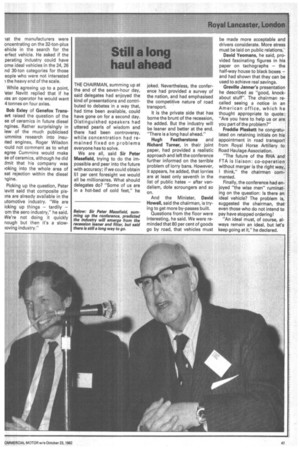THE CHAIRMAN, summing up at the end of the seven-hour
Page 33

If you've noticed an error in this article please click here to report it so we can fix it.
day, said delegates had enjoyed the kind of presentations and contributed to debates in a way that, had time been available, could have gone on for a second day. Distinguished speakers had uttered pearls of wisdom and there had been controversy, while concentration had remained fixed on problems everyone has to solve.
We are all, said Sir Peter Masefield, trying to do the impossible and peer into the future with accuracy; if we could obtain 51 per cent foresight we would all be millionaires. What should delegates do? "Some of us are in a hot-bed of cold feet," he joked. Nevertheless, the conference had provided a survey of the nation, and had emphasised the competitive nature of road transport.
It is the private side that has borne the brunt of the recession, he added. But the industry will be leaner and better at the end. "There is a long haul ahead."
Hugh Featherstone and Richard Turner, in their joint paper, had provided a realistic approach and left the conference further informed on the terrible problem of lorry bans. However, it appears, he added, that lorries are at least only seventh in the list of public hates — after vandalism, dole scroungers and so on.
And the Minister, David Howell, said the chairman, is trying to get more by-passes built.
Questions from the floor were interesting, he said. We were reminded that 80 per cent of goods go by road, that vehicles must be made more acceptable and drivers considerate. More stress must be laid on public relations.
David Yeomans, he said, provided fascinating figures in his paper on tachographs — the half-way house to black boxes — and had shown that they can be used to achieve real savings.
Greville Janner's presentation he described as "good, knockabout stuff". The chairman recalled seeing a notice in an American office, which he thought appropriate to quote: "Are you here to help us or are you part of the problem?"
Freddie Plaskett he congratulated on retaining initials on his appointment in road transport from Royal Horse Artillery to Road Haulage Association.
"The future of the RHA and ETA is liaison: co-operation without merger is the right way, I think," the chairman commented.
Finally, the conference had enjoyed "the wise men" ruminating on the question: Is there an ideal vehicle? The problem is, suggested the chairman, that even those who do not intend to pay have stopped ordering!
"An ideal must, of course, always remain an ideal, but let's keep going at it," he declared.


















































































































